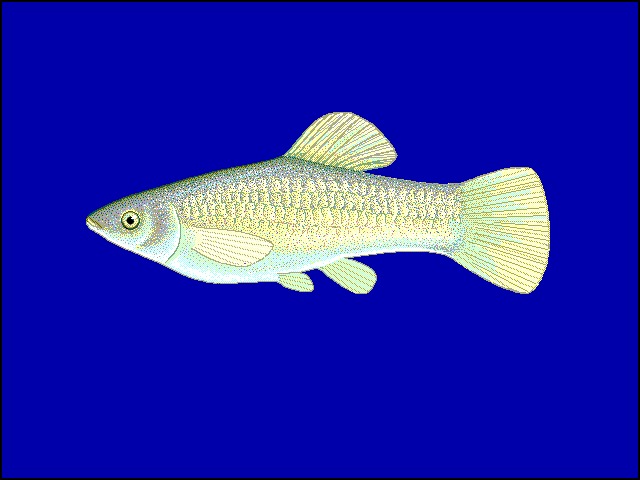Amazons Of The Sea; The Fish Species That Has No Known Male
An all-female inhabitation, with individuals fulfilling every societal role and assuming all responsibilities for their kind, clan and specie…well, almost all responsibility.
Sound familiar? …no, this is not an imagination of a feminist utopia, nor is it a manifestation of the DC comic universe, (sit down wonder woman, this isn’t about you.) this the everyday reality of the Poecilia Formosa popularly known as the aptly named Amazon Molly.
As it turns out, the famed Amazon warriors of Greek mythology are not the only ones who decided that they do not need male counterparts for survival. The Amazon molly, an all-female fish species has been living without male help for…wait for it…over 200,000 years.
Yes, you did not read that wrong. They played all the dudes, ALL OF THEM!!
The Amazon molly, a freshwater fish species, endemic to the Texas-Mexico border, reproduces through some weirdly rather interesting biology. It has over time figured out how to clone itself (offspring’s that are exact replicas of the mother), without any male DNA.
The Amazon molly (Poecilia formosa) mates with the males from one of four different species (closely related to it), stealing their sperm to activate their eggs. While the sperm from the male does pierce the female ovum, the Amazon molly’s eggs destroys any trace of male genes so that it doesn’t contribute to their genetics thus beginning the cloning process.
This process is known as gynogenesis…
…or genetically defrauding sperm donors. The nerve!
Scientists have long theorized that this form of sexual reproduction (gynogenesis) would result in extinction for the Amazon molly.
A sprinkle of sassiness and girl power, now look how that turned out.
There are various reasons why the majority of animals (in this case, mostly vertebrates) reproduce sexually. Chief among which is a species' ability to adapt to changing environments. With all members of a population being clones of a single founding individual, there is very little genetic variation. Most species that employ (or had employed) asexual reproduction are marked by a lack of genetic variation.
Scientists are of the believe that animals, plants and other living things that this style of reproduction take place in them does not possess the capability to survive the ravishes of new pathogens and other dangers that might arise as their immediate environments changes. An example is the Penicillium marneffei an asexual fungus native to Southeast Asia that has failed to spread into new environments.
A recent research into the Poecilia Formosa reveals how it’s been able to avoid such occurrences. In an article published in the journal Nature Ecology & Evolution, the researchers mapped the Poecilia Formosa's genome by comparing it to the genomes of two other related fish species. It was discovered that a high level of genetic variability in the Poecilia Formosa's immune-system genes, and they believe this enables the fish to adapt and be sensible to dangers and preys in its environment.
The researchers after the findings wrote in the same journal that they unexpectedly and surprisingly found no widespread signs of genomic decay, which simply means that the fish’s genes evolved along with its surroundings, rather than stagnated.
During that same research, they also discovered that the Poecilia Formosa seems to have kept some of the sexual organs it doesn’t even use or need. You will agree with me that it's a very uncommon trait, because many other fish species are commonly known and believed to always lose the organs they didn’t need for reproduction or that are not useful to them but as for the Poecilia Formosa, that's not the case (that's interesting right?). This latest discovery seems to be forcing scientists to reconsider their thoughts about asexual reproduction.
Being an offspring of two parent fish called Poecilia latipinna (Sailfin molly) and Poecilia mexicana (Atlantic molly), it may be that the coming together of those two fishes about two million years ago, created a perfect storm of genes. Rather than seeing the resulting asexual species as inferior, researchers are considering the hybrid genome as a strength, calling it “rare-formation hypothesis.”
“We propose that genetic diversity between clones offers at minimum a short-term benefit to the asexual species in coping with environmental challenges,” the study states. It was also said in the study that for the species that can easily acquire new adaptive mutations, they will thrive and live in no danger while others that can't, will disappear and perhaps go into extinction.
Scientists and researchers are on the verge of studying the biological basis of sex from the gene sequence of this species and get to learn more about its sex evolution as a factor in creating stronger individuals in a species.
Another all-female species is called the marbled crayfish which has been invading ecosystems and its environments all over the world by multiplying rapidly. Researchers are of the opinion that one marbled crayfish can give birth to between 200 - 300 in just two months.
The interesting thing is, there are many other vertebrates that reproduce asexually, and examples are the hammerhead sharks and box turtles, but the thing is, none of them are as remarkable and adaptive in genetic strength as molly fish.
Yes, you can go ahead and scream Girl power!!!
Image Source
This Image is from free source
References


Congratulations @jajdgenius! You have completed some achievement on Steemit and have been rewarded with new badge(s) :
Click on any badge to view your own Board of Honor on SteemitBoard.
To support your work, I also upvoted your post!
For more information about SteemitBoard, click here
If you no longer want to receive notifications, reply to this comment with the word
STOP